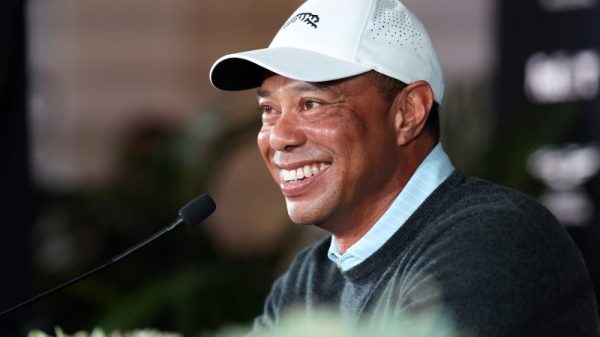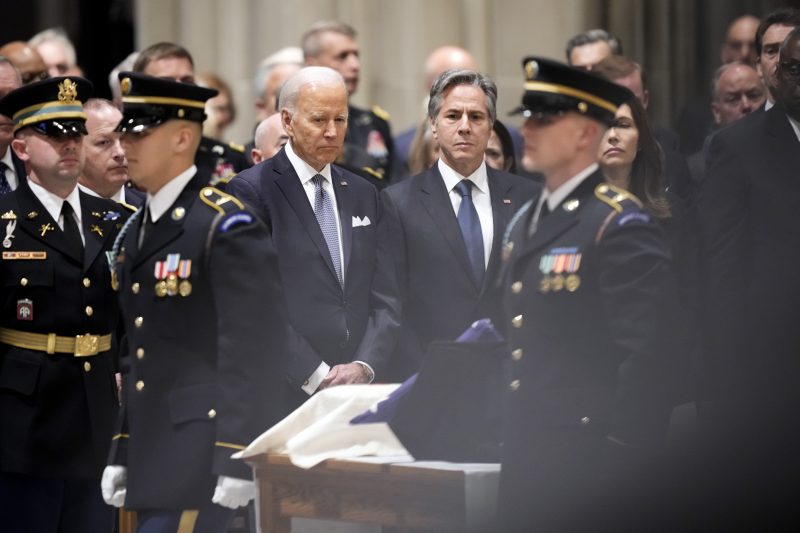President Biden on Thursday paid tribute to former defense secretary Ashton B. Carter, who died Oct. 24 at the age of 68.
At a memorial service at Washington National Cathedral, Biden remembered Carter as a devoted public servant and brilliant scientist who made the military more inclusive during his tenure.
“Ash was a force. He was a force of nature,” Biden said. “His genius was evident, his integrity unfailing and his commitment to service before self was literally inspiring.”
Biden recalled Carter’s lengthy career, which combined a background in theoretical physics with leadership on nuclear and defense policies. In the 1990s, Carter worked with his mentor, former Defense Secretary Bill Perry, to reduce the risk of nuclear proliferation after the Soviet Union collapsed. After he became defense secretary himself, Carter worked to fight the rise of Islamic State extremists and to “smash their hold on territories in Iraq and Syria,” Biden said.
“Ash always took the hardest jobs, the seemingly impossible missions, because he believed he could make a difference. And he did make a difference,” Biden said.
Carter served as defense secretary from February 2015 until President Barack Obama left office in January 2017. During his tenure leading the Department of Defense, Carter oversaw the opening of military combat roles to women and helped boost Pentagon ties with Silicon Valley. In 2016, Carter opened the armed forces to transgender men and women to enlist with some exceptions. The policy was repealed by the Trump administration and then reinstated under the Biden administration last year.
“I stand here today as commander in chief of, as Ash always said, the finest fighting force the world has ever known,” Biden said. “A force made stronger and more inclusive by Ash’s principles and convictions. A force made up of warriors who are safer because of Ash’s determination to protect them and give them what they needed.”
Biden joked that Carter not only believed in getting things done but getting things done in record time, relishing in “busting through bureaucratic red tape” to transform whatever role he held — sometimes a challenge for his staffers. But Biden said that tenacity and sense of urgency saved troops’ lives, citing Carter’s push in the 2000s for mine resistant ambush protected vehicles, or “MRAPs,” for U.S. service members in Iraq and Afghanistan.
“He made it his mission to work at war speed to get our warfighters the best possible protection we could give them, as fast as possible,” Biden said.
Biden added that when Carter learned troops in the field were having visibility issues in MRAPs, he personally visited the research and development facility to see the problem for himself and refine the vehicle’s design. By 2012, the U.S. had deployed more than 24,000 MRAPs, and casualty rates among troops transported in them came down by as much as 75 percent compared to those riding in Humvees, Biden said.
To this day, Biden keeps at his office at home a large photograph of MRAPs lined up, side by side, with a signed note from Carter.
“It’s amazing what he did with his background as a scientist,” Biden said. “He got it done and he literally saved, I think … hundreds and hundreds, thousands of lives and limbs. He protected our service members’ futures because they were out defending ours.”
Defense Secretary Lloyd Austin, who also spoke at Carter’s memorial service Thursday, recalled Carter as “a giant at the Pentagon” who was always “a man in a hurry.”
“Ash’s scientific mindset drove him to always face facts, especially painful ones. So as the president noted, he took on the DOD bureaucracy whenever it lagged behind,” Austin said.
Nevertheless, Carter also made time to meet service members and loved to teach and mentor.
“He loved to visit some far-flung U.S. base and hear a former student shout, ‘Hey, Professor Carter!’ And he loved to walk the halls of the Pentagon and to visit our troops,” Austin said.
After leaving Washington, Carter became the director of the Belfer Center for Science and International Affairs at Harvard’s Kennedy School.
Brian Murphy, Dan Lamothe and Alex Horton contributed to this report.



























